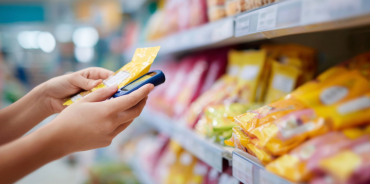Health, sustainability, inspiration, and more: the new priorities shaping the future of New Zealand grocery
It’s been almost half a year since we checked in with New Zealand’s grocery shoppers. When we did—by way of our last round of Consumer Pulse research—we found a nation in two minds. Prices at the shelf remained high, respondents told us, but there were reasons to be optimistic, too. Consumer confidence was growing, and customers appeared to be shopping less frugally than they had for some time.
Have those trends persisted, though? Are concerns about the state of the economy continuing to dwindle? Let’s find out by exploring the results of our latest Pulse study.
Worries about finances remain high—and price perception is a challenge
New Zealand’s economy continues to struggle in the post-Covid period, GDP shrinking by 0.2% between June 2023 and June 20241. In line with that, shoppers are wary about their own prospects. 35% of respondents to the Pulse described their personal financial situation as “bad”, only a slight decline on our previous round of research (38%). Concerns about the national economy remain similarly static (55% vs 57% in June).
As we saw in our last study, of course, “green shoots” do exist here. The number of shoppers who feel like their money “no longer goes as far as it used to” continues to drop, down from 64% in June to 62% today. Optimism may not be growing as fast as it was, but it is still growing.
For retailers and brands, however, the pressure on price perception persists. 65% of New Zealanders believe that food prices are “a lot” higher than they were 12 months ago. While that’s a decline on the numbers from June (73%) and September 2023 (84%), it still means that two-thirds of shoppers believe that prices are continuing to rise.
With food inflation having actually fallen dramatically during that time2, it’s clear that there’s some way to go before customers feel that life has truly normalised.
Value-seeking practices persist—but new behaviours are emerging
In line with the results above, many shoppers continue to embrace “value seeking” strategies. Well over half (60%), for example, say they currently buy own-label goods, and plan to continue doing so in the future. 54% say the same of searching online to find the best deals, and 50% plan to maintain their use special offers on goods they buy regularly.
It’s not all about finding ways to bring down the cost of a shop, though. A quarter (25%) say that—while they don’t today—they’re planning to order groceries online. An almost identical number (24%) are planning to enlist the services of artificial intelligence (AI) tools like ChatGPT
in their shopping, presumably with the intention of searching for recipes or inspiration. Cutting costs might continue to be a concern for many, but Kiwis aren’t averse to new ideas.
At the shelf, what’s new and what’s nourishing is what grabs attention
New Zealanders aren’t just turning to AI for inspiration—they’re looking for it at the shelf, too. Across a range of different categories, we also asked respondents what matters most when choosing which products to buy. While “the cheapest prices or best deals” was always the most popular response here, plenty of shoppers told us that they’re looking for a little excitement from what they buy too.
Take confectionery. While 58% tend to pick products based on price, 26% say they “love discovering new and exciting products”. The same is true for snacks (23%), bakery (22%), alcoholic beverages (21%), and ready-to-eat (20%). Even in these cost-conscious times, novelty goes a long way.
Health is a major concern, too. In line with the fact that around half of New Zealanders say that eating healthily makes them feel good (45%), and that a third try to opt for healthier items when shopping (36%), the impact on health is a key driver in a number of categories. Seafood (33%), baby products (also 33%), fresh produce (28%), and natural / organic (27%) all see a significant number of purchasing decisions driven by wellbeing considerations.
Future trends are focused firmly on good behaviours—both personal and professional
Low prices, new products, and healthier choices. That’s what seems to matter most to Kiwis today—but what about tomorrow? Turning our attention to future trends, the possibilities that seem to excite New Zealanders most are almost exclusively focused on “good behaviours”.
We already know that sustainability is a key issue for many of the country’s shoppers. Around half (44%) say they’re conscious about the environment, and a fifth (20%) buy lower impact products when shopping. And, when we look ahead to the next few years, it tends to be environmentally focused trends that shoppers are the most enthusiastic about.
Some of those trends are about shopper behaviours. 41% of respondents say that they’re excited about the prospect of growing more of their own food, for instance, and 40% say the same about buying food from local farmers.
Most of the things that customers are excited about tend to involve some degree of effort on the part of retailers and brands, however. 28% say they’re looking forward to packaging becoming better for the environment, 21% companies doing good things for the environment, and 20% buying products made from reused materials.
The environment isn’t their sole concern, of course. Going back to the above point on inspiration, 16% are excited about foods that mix flavours from different cultures. 15% say the same about kitchen gadgets that can perform multiple tasks, and 14% are excited about the prospect of gadgets that can make their home smarter. That appetite for what’s new applies everywhere, it seems.
In some ways, it’s difficult to read the results of this latest Pulse without feeling like the optimism we saw last time around has slowed. At the same time, it’s also clear that—while New Zealanders might remain cautious in the face of a tougher economy—they’re very much looking to the future. For the brands that can tap into that optimism—particularly those “good behaviours”—the opportunities will be plentiful.
The Consumer Pulse is dunnhumby’s global research programme, providing regular insight into the thoughts and behaviours of grocery shoppers from key markets including New Zealand, Germany, France, and the UK. This round of research for New Zealand incorporates the views of 400 grocery shoppers.
1 Gross domestic product (GDP) – stats.govt.nz
2 Annual percentage change in the food price index in New Zealand from January 2016 to July 2024
TOPICS
RELATED PRODUCTS
Truly understand your Customers and unlock your Customer First transformation with Strategy Development, Research & Insights and Organisation Engagement
Build a differentiated Customer strategyThe latest insights from our experts around the world



